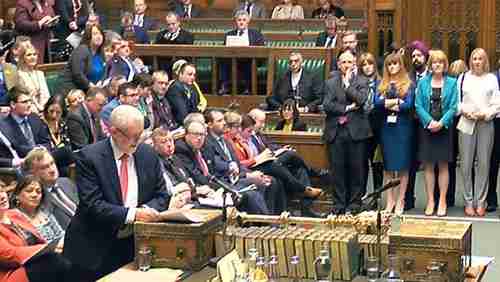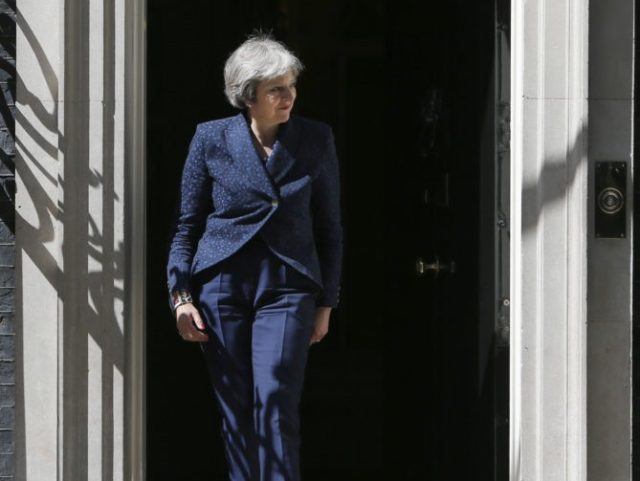This morning’s key headlines from GenerationalDynamics.com
- Britain’s government in chaos as no-deal ‘hard Brexit’ looms
- Ireland border problem continues to be insurmountable
- IMF warns of harsh economic effects of no-deal Brexit
Britain’s government in chaos as no-deal ‘hard Brexit’ looms

Labor Party leader Jeremy Corbyn in House of Commons says that ‘the government has sunk in a mire of chaos and division’
Ireland’s Taoiseach (prime minister) Leo Varadkar says that Ireland will have to hire about 1,000 new customs and veterinary inspectors by 2021 in the case of a “hard Brexit,” which is appearing to be more and more likely every day.
As the UK continues to move toward the Brexit cliff-edge on March 29, 2019, it is not possible to discern the current status of the UK-EU negotiations on the subject, because it is in total chaos, and even if you did figure it out, then you would have to figure it out again a minute later.
Two weeks ago, UK Prime Minister Theresa May appeared to have achieved stability with something that is now called “the Chequers plan,” because she was able to get it approved by her Tory cabinet at a meeting at Chequers, the prime minister’s country residence. The proposal specified that a “common rule book” between the EU and the UK would be created. This was to be enough to satisfy the “Remainer” faction of her party, those in the party who never wanted Brexit in the first place but who could live with a set of rules that would make it seem that the UK had never left the EU.
However, it ended up angering the “Leave” or “Brexiteer” faction, who did want the UK to leave the EU, because the common rulebook would force the UK would to follow all the same standards and regulations as if it had never left the EU. So, even though May’s cabinet voted for the Chequers plan, four days later David Davis, the Brexit secretary, resigned. That resignation was followed by a second one, by international superstar Boris Johnson.
Then late last week, May was forced to accept four amendments to the Chequers plan, demanded by the Leave faction of the Tories. With so many flip-flops, it looked like the plan was dead. But on Thursday, Theresa May denied claims the trade proposals were “dead in the water” after accepting the four amendments.
So, as of today, it is not clear whether May could get agreement within her own Tory party. If she succeeds, she has to get the agreement of the House of Commons. If she succeeds, she would have to get agreement from the other 27 nations of the European Union. (An additional issue is that Labor party leader Jeremy Corbyn is being seriously accused of anti-Semitism. This is apparently a big story, and it is causing chaos in the Labor party that may spill over into the chaos of the Brexit negotiations.)
There are still other proposals floating around, but the important point is that there is no proposal, including the Chequers proposal, that is likely to get a majority vote. If no proposal can get a majority vote, then when the UK “crashes out of” the EU on March 29, it will be a “no-deal Brexit,” otherwise known as a “hard Brexit.” Nobody (or almost nobody) wants a hard Brexit, but many analysts now consider that to be the most likely outcome. BBC and Irish Times and BBC (9-Jul)
Ireland border problem continues to be insurmountable
After 16 months of debate since the Brexit referendum passed, there is one particular problem has proven to be unsolvable: The status of the border between Northern Ireland, which is part of the UK, and the Republic of (Southern) Ireland, which is part of the EU.
Everyone wants a “soft border” between the two regions, but if the UK is no longer in the EU, then any people and goods passing over the border would have to go through customs, have the passports and visas checked, and possibly pay customs duties and fees. No one wants this, but there is no solution to this problem. Solutions that have been proposed include:
- Some sort of high-tech solution that uses sensors to check goods and passports as vehicles are zipping across the border. This is completely a political fantasy.
- Keep Ireland and Northern Ireland as a single customs union, but then have a customs border in the Irish Sea. This means that goods and services passing between Ireland+Northern Ireland on the one hand, and England+Wales+Scotland, on the other hand, would have to have passports and visas checked, and pay customs duties and fees. This could work, but everyone really hates it. Furthermore, it would encourage the Catholic Republicans in Northern Ireland to declare that Northern Ireland should secede from the UK and be part of Ireland, possibly igniting a new war in Ireland.
- For several months, a mythical “Ireland Backstop” proposal has been floating around. It has never been clearly defined, but it appears to be the same as the “Irish Sea” proposal above, except that it would be time-limited in some way.
None of these has a high probability of succeeding. So that is why Ireland’s Taoiseach (prime minister) Leo Varadkar is making plans to hire about 1,000 new customs and veterinary inspectors, to prepare Irish seaports and airports for the change of rules in case of a hard Brexit:
That involves preparing for and hiring veterinary inspectors to carry out sanitary checks on agricultural products and plant-based products coming in from Britain and also customs inspectors.
We estimate we will have to hire about 1,000 customs and veterinary inspectors to prepare our ports and airports for Brexit.
In the unlikely event of a no-deal Brexit next March, of course it will not be possible to have 1,000 people in place for then but we will make contingency arrangements in the event that might arise.
Varadkar also warned that UK planes could be restricted from flying in EU airspace in the event of a no deal Brexit. He said UK could not take back its waters and expect to use EU skies. “You can’t have your cake and eat it,” he said. RTE (Ireland) and Irish Times and Business Insider (3-Jun)
IMF warns of harsh economic effects of no-deal Brexit
International Monetary Fund (IMF) analysis of Brexit finds that that EU countries would lose 1.5 percent of their GDP and more than a million jobs, in the case of a no-deal Brexit. Ireland would be worst hit, losing 4 percent of its economy, due to its close trade ties with Britain. The Netherlands, Belgium, and Luxembourg would also be hit hard. Germany would also suffering due to industrial supply chains.
The IMF did not estimate the costs to Britain, but an earlier Bank of England analysis put the cost at 1.5-2.0 percent of the economy, while other estimates put the figure at 4 percent. Reuters and International Monetary Fund (IMF) and Guardian (London)
Related Articles
- Brexit negotiations in crisis as deadlines approach with no agreements (09-May-2018)
- Ireland border issue continues to confound Brexit negotiations (17-Mar-2018)
- Brexit negotiations collapse over Ireland border issue (05-Dec-2017)
- European anger and British self-delusion follow Brexit plan speech (19-Jan-2017)
- Britain’s Millennials are furious at Boomers for Brexit vote (26-Jun-2016)
- Sectarian violence in Northern Ireland grows again (23-Jun-2011)
KEYS:
Generational Dynamics, Ireland, Leo Varadkar, Brexit, EU, UK, Theresa May, Chequers, David Davis, Boris Johnson, Jeremy Corbyn, Ireland Backstop, International Monetary Fund, IMF
Permanent web link to this article
Receive daily World View columns by e-mail

COMMENTS
Please let us know if you're having issues with commenting.